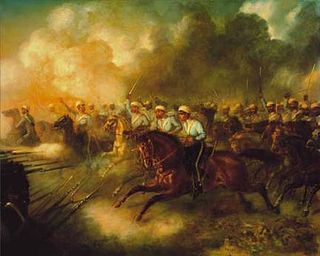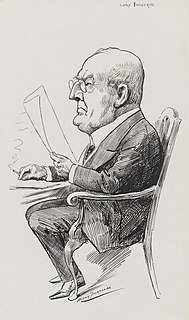
HMT Rohna was a British India Steam Navigation Company passenger and cargo liner that was built on Tyneside in 1926 as SS Rohna and requisitioned as a troop ship in 1940. Rohna was sunk in the Mediterranean in November 1943 by a Henschel Hs 293 guided glide bomb launched by a Luftwaffe aircraft. More than 1,100 people were killed, most of whom were US troops.

The Royal Indian Navy (RIN) was the naval force of British India and the Dominion of India. Along with the Presidency armies, later the Indian Army, and from 1932 the Indian Air Force, it was one of the Armed Forces of British India.

The Bombay Presidency, also known as Bombay and Sind from 1843 to 1936 and the Bombay Province, was an administrative subdivision (presidency) of British India. Headquartered in the city of Bombay, at its greatest extent, the presidency included the Konkan, Nashik and Pune divisions of the present-day Indian state of Maharashtra, Ahmedabad, Anand, Bharuch, Gandhinagar, Kheda, Panchmahal and Surat districts of the present-day state of Gujarat, Bagalkot, Belagavi, Bijapur, Dharwad, Gadag, and Uttara Kannada districts of the present-day state of Karnataka and the South Canara (Dakshina Kannada and Udupi district including Kasargod District of Kerala; the Sindh province of present-day Pakistan; the Aden Colony, and the Khuriya Muriya Islands.
Rail transport in India began during the early nineteenth century.
Trams in India were established in the late-19th century. Horse-drawn trams were introduced in Kolkata in 1873; electric trams began in Chennai in 1895, and trams were also introduced in Mumbai, Nashik, Kanpur, Kochi, Patna and Bhavnagar. They were discontinued in all Indian cities between 1930 and 1970, except for Kolkata.

The second USS Oneida was a screw sloop-of-war in the United States Navy. During the Civil War, she destroyed the CSS Governor Moore and served in blockade operations. She was attached to the Asiatic Squadron from 1867–1870. She sank in 1870 outside Yokohama, Japan after collision with the British steamer Bombay. The Court of Inquiry found the officers of Oneida were responsible for the collision. Bombay's captain was blamed for not staying at the scene to render assistance - a decision that caused some controversy. Japanese fishing boats saved 61 sailors but 125 men lost their lives. The American government made no attempt to raise the wreck and sold it to a Japanese wrecking company. The company recovered many bones from the wreck and interred them at their own expense. The Japanese erected a memorial tablet on the grounds of Ikegami Temple in Tokyo and held a Buddhist ceremony in the sailor's memory in May 1889.

The Provinces of India, earlier Presidencies of British India and still earlier, Presidency towns, were the administrative divisions of British governance in India. Collectively, they were called British India. In one form or another, they existed between 1612 and 1947, conventionally divided into three historical periods:

The Anglo–Persian War lasted between November 1, 1856 and April 4, 1857, and was fought between Great Britain and Iran (Persia) which was at the time ruled by the Qajar dynasty. In the war, the British opposed an attempt by Iran to press its claim on the city of Herat. Though Herat had been part of Iran under the Qajar dynasty at the time the war broke out, it had declared itself independent under its own rebellious emir and placed itself under the protection of the British in India and in alliance with the Emirate of Kabul. The British campaign was successfully conducted under the leadership of Major General Sir James Outram in two theatres—on the southern coast of Iran near Bushehr and in southern Mesopotamia. The war resulted in Persians withdrawing from Herat and signing a new treaty in which it surrendered its claims on the city, and the British withdrawing from southern Iran.

The Bombay, Baroda and Central India Railway (BB&CI) was a company incorporated in 1855 to undertake the task of constructing a railway line between Bombay and Vadodara in India. BB&CI completed the work in 1864. The first suburban railway in India was started by BB&CI, operating between Virar and Churchgate, a railway station in Bombay Backbay in April 1867.

James Lyle Mackay, 1st Earl of Inchcape,, known as Sir James Mackay from 1894 to 1911, was a British businessman and colonial administrator in India who became Chairman of the Peninsular and Oriental Steam Navigation Company ("P&O").
Steam Navigation Companies became widespread during the 19th century after the development of steam-powered vessels, both steamboats, which were generally used on lakes and rivers, and ocean-faring steamships. Companies that share the name Steam Navigation Company include the following, listed by their country of ownership.
Thomas Carr M.A., D.D. was the inaugural Bishop of Bombay between 1837 and 1851.
Human habitation of Mumbai existed since the Stone Age, the Kolis were the earliest known settlers of the islands. The Maurya Empire gained control of the islands during the 3rd century BCE and transformed it into a centre of Buddhist culture and religion. Later, between the 2nd century BCE and 9th century CE, the islands came under the control of successive indigenous dynasties: Satavahanas, Abhiras, Vakatakas, Kalachuris, Konkan Mauryas, Chalukyas and Rashtrakutas, before being ruled by the Silharas from 810 to 1260.
Bombay, now called Mumbai, Bombaim in Portuguese, is the financial and commercial capital of India and one of the most populous cities in the world.

The Scindia Steam Navigation Company was one of the oldest Indian shipping companies. Founded in 1919, envisioned by Walchand Hirachand, it was a joint venture of Walchand along with Narottam Morarjee, Kilachand Devchand and Lallubhai Samaldas all of them businessmen hailing from Gujarat. It played a significant role in Indian independence. It was the first large scale Indian owned shipping company and started an India — Europe service with the Loyalty, but was forced to sign a 10-year agreement with British companies and its shipping route was restricted to the Indian coastal shipping trade for this period.
SS Sirsa was a steamship built at A. & J. Inglis in 1883 and owned by the British India Steam Navigation Company.

Kurla is a railway station on the Central and Harbour lines of the Mumbai Suburban Railway network. It is among the oldest railway stations in India, it being part of the original 21 mile (33.8 km) Great Indian Peninsular Railway (GIPR) section between Bombay (Mumbai) and Tannah (Thane) that opened in 1853.

The Ahmedabad–Mumbai main line is a railway route on the Western Railway section of Indian Railways. It is one of the busiest railway route of the Indian Railways, and is fully electrified.













